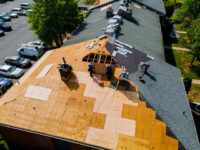Choosing a Roofing Company
Managing Roofing Company Near Me takes more than just swinging a hammer. You need to deal with marketing, customer service, waste management, safety standards and more.

Your roof is one of your biggest investments. Always do your research before hiring a contractor to make sure they’re legitimate. Ask for client references and a copy of their contract. Also, ask if they offer product warranties and workmanship guarantees.
The experience of working as a roofing contractor is one that can be both rewarding and challenging. It can provide a steady stream of income and the freedom to be your own boss, but it’s also demanding and dangerous work that requires physical endurance and a focus on safety. Whether you’re just starting out or have years of experience under your belt, understanding the pros and cons of this career can help you determine if it’s the right fit for you.
When choosing a roofing company, look for ones that have been around for years and can provide references from past clients. You can also find out more about a potential roofing contractor’s reputation by looking at their online reviews. This will give you an idea of how satisfied previous customers have been with the quality of their work and how responsive the company has been in handling any issues that may arise during or after the project is completed.
A reliable roofer should be able to provide you with a detailed estimate that includes the cost of materials and labor, as well as a time frame for when they can begin and finish the job. Some contractors may also offer warranties or guarantees for their services, which can provide peace of mind and reassure you that they stand behind the quality of their work.
Another thing to consider is a roofing contractor’s equipment and training. Roofing experts have access to specialized tools and equipment that general contractors do not, which can make them more effective at completing your roofing project. Additionally, roofing experts have extensive knowledge about the different roofing materials and techniques available in the market, which can help them advise you on the best options for your home.
When looking for a roofing company, you should also check their licenses and insurance coverage to ensure they are legitimate and insured. Additionally, you should ask them about any manufacturer accreditations that they may have, as this shows their dedication to their craft and can be a sign of the level of quality you can expect from them.
Local Reputation
When choosing a roofing contractor, it’s important to consider their reputation within your community. A local contractor is familiar with local building codes and climate considerations, and has established relationships with area suppliers. This can help ensure that your project is completed on time and in compliance with local regulations. In addition, a local contractor will be easier to reach for follow-up work or warranty claims. Look for reviews online and in your neighborhood, and ask neighbors or friends about contractors they trust.
A reliable roofing company should also be able to provide references from previous clients and explain how they communicate with customers during a project. They should be able to answer questions about the process and timeline, daily work schedules, weather delays or unforeseen issues that may impact progress, and be committed to keeping you informed throughout the project. This level of communication reflects a contractor’s professionalism and accountability.
Local Online Reviews
Whenever you make any significant purchase, online reviews play a key role in the decision making process. It’s not different when it comes to a roofing company. Local online reviews can tell you a lot about the company’s quality of work and their level of professionalism. They can also help you identify any red flags such as scammers who are only interested in collecting money and not providing quality services.
In addition to online reviews, you should ask a potential roofing contractor for references from past clients. This gives you the opportunity to discuss your concerns and ask questions about their experience with the roofer in question. For example, you can find out whether the roofer is punctual, responsive, and communicates clearly with their clients. You can also learn if they were able to meet project timelines and budget expectations.
Another thing to look for is certifications and licenses. This can give you confidence that the roofing contractor is legitimate and has the skills and knowledge needed to perform high-quality work. You can also see if they adhere to industry standards by carrying insurance and following proper safety protocols.
Lastly, you should also check out the company’s BBB rating. If they have a good BBB rating, it shows that the company has been held to a higher standard by the Better Business Bureau and that they have been found trustworthy and responsible. You should avoid contractors who do not have a BBB rating or whose ratings are poor. They may be looking to take advantage of homeowners and pressure them into signing a contract without any other options.
Warranty
A roofing warranty is an assurance that a professional roofing contractor will take responsibility for the quality of their work. This can help ease a homeowner’s stress and reduce financial risks, and it can also enhance the home’s resale value. When choosing a roofer, homeowners should ask about their roofing warranties and how they are administered. There are two main types of roofing warranties: manufacturer and contractor. Manufacturer warranties cover material defects, while contractor warranties guarantee the installation process.
Manufacturer warranties protect homeowners from issues with the roofing materials, such as shingle and tile defects. These can cover replacement costs for a period of time, or even for a lifetime. However, the warranties are only valid if the materials come from the same manufacturer and are installed by certified contractors who follow manufacturer guidelines. If any of these conditions are violated, the manufacturer may void the warranty.
In addition to the standard manufacturer warranty, some roofing companies offer additional protection with an extended warranty. These warranties can cover issues like algae protection and impact resistance, providing extra peace of mind for homeowners. However, homeowners should carefully review the terms and conditions of these warranties to ensure they are right for them.
Some manufacturers will only offer their warranty if the roofing system is properly maintained and professionally inspected by a qualified roofer. This can include regular maintenance and cleaning, as well as adherence to strict guidelines for installing the system. Homeowners should always consult their roofing professionals about the specifics of their roofing warranties, as the terms can vary greatly from one company to another.
If something goes wrong with your roof, it’s important to report it immediately to the manufacturer or roofing company. Failure to report problems within 30 days can result in the warranty being voided. It’s also a good idea to have documentation of the issue, including photographs and notes.






